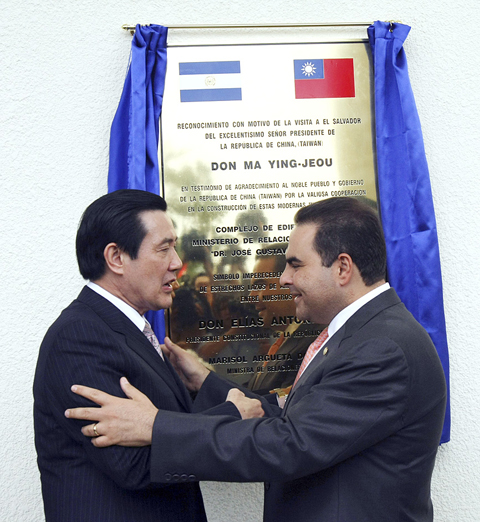Salvadoran president-elect Mauricio Funes told President Ma Ying-jeou (馬英九) that his new administration would maintain diplomatic ties with Taiwan, despite supporting closer relations with Beijing during his election campaign.
Presidential Office Public Affairs Department Director Tsai Chung-li (蔡仲禮), who is accompanying Ma, said Funes told Ma during their meeting that his administration hoped to develop business relations with China.
Ma told Funes he was not against the idea, but hoped his administration would continue diplomatic relations with Taiwan as the two were not mutually exclusive.

PHOTO: AP
Funes told Ma that based on the long-standing friendship and cooperation between Taiwan and El Salvador, he would “maintain diplomatic relations with the Republic of China.”
After Funes expressed concern over the development of his country’s agricultural sector, Ma promised to provide El Salvador with technical assistance in rice and fruit cultivation as well as aquaculture.
Ma also touched on the issue of clean government, saying that future foreign aid would be distributed under the principles of legality, effectiveness and appropriateness.
Ma was leading a 159-member delegation to Funes’ inauguration yesterday. Accompanying him were first lady Chow Mei-ching (周美青), local government heads, college officials, student representatives and a performance group.
Ma made a stopover in Los Angeles on his way to El Salvador and will stop in Seattle on his way back. The delegation is scheduled to return to Taipei on Thursday.
Before Ma’s meeting with Funes, he visited outgoing Salvadoran President Elias Antonio Saca.
Saca, who was close to former president Chen Shui-bian (陳水扁), was 40 minutes late, cutting the scheduled 50-minute meeting to 30 minutes.
Minister of Foreign Affairs Francisco Ou (歐鴻鍊), who is also on the trip, said Saca was late because he had to meet leaders from more than 10 counties.
Commenting on local reports that China would send a delegation to the inauguration, Ou said his understanding was that they would be Chinese Communist Party representatives. He did not know the capacity in which they would be visiting and said there would be no concerns over dual recognition if they were not government officials.
During interviews with Salvadoran media, Ma said his administration would continue to strive for Taiwan’s participation in UN activities.
Describing Taiwan’s attendance at this year’s World Health Assembly as an observer as a “significant breakthrough,” Ma said his government would adopt a more proactive, diverse and practical approach to seek participation in UN activities.
Ma also touted his cross-strait policy, saying a flexible approach had improved relations across the Taiwan Strait.
“Under such circumstances, El Salvador does not have to take sides because you can keep diplomatic ties with Taiwan and develop trade relations with China,” he said.
Meanwhile, National Security Council Secretary-General Su Chi (蘇起), who is also traveling with Ma, called reports that he had secretly visited Washington last week “misinformation.”
The Chinese-language China Times quoted anonymous sources as saying that Su’s clandestine visit to Washington was a “breakthrough in dialogue on national security.”

WAITING GAME: The US has so far only offered a ‘best rate tariff,’ which officials assume is about 15 percent, the same as Japan, a person familiar with the matter said Taiwan and the US have completed “technical consultations” regarding tariffs and a finalized rate is expected to be released soon, Executive Yuan spokeswoman Michelle Lee (李慧芝) told a news conference yesterday, as a 90-day pause on US President Donald Trump’s “reciprocal” tariffs is set to expire today. The two countries have reached a “certain degree of consensus” on issues such as tariffs, nontariff trade barriers, trade facilitation, supply chain resilience and economic security, Lee said. They also discussed opportunities for cooperation, investment and procurement, she said. A joint statement is still being negotiated and would be released once the US government has made

‘CRUDE’: The potential countermeasure is in response to South Africa renaming Taiwan’s representative offices and the insistence that it move out of Pretoria Taiwan is considering banning exports of semiconductors to South Africa after the latter unilaterally downgraded and changed the names of Taiwan’s two representative offices, the Ministry of Foreign Affairs (MOFA) said yesterday. On Monday last week, the South African Department of International Relations and Cooperation unilaterally released a statement saying that, as of April 1, the Taipei Liaison Offices in Pretoria and Cape Town had been renamed the “Taipei Commercial Office in Johannesburg” and the “Taipei Commercial Office in Cape Town.” Citing UN General Assembly Resolution 2758, it said that South Africa “recognizes the People’s Republic of China (PRC) as the sole

NEW GEAR: On top of the new Tien Kung IV air defense missiles, the military is expected to place orders for a new combat vehicle next year for delivery in 2028 Mass production of Tien Kung IV (Sky Bow IV) missiles is expected to start next year, with plans to order 122 pods, the Ministry of National Defense’s (MND) latest list of regulated military material showed. The document said that the armed forces would obtain 46 pods of the air defense missiles next year and 76 pods the year after that. The Tien Kung IV is designed to intercept cruise missiles and ballistic missiles to an altitude of 70km, compared with the 60km maximum altitude achieved by the Missile Segment Enhancement variant of PAC-3 systems. A defense source said yesterday that the number of

Taiwanese exports to the US are to be subject to a 20 percent tariff starting on Thursday next week, according to an executive order signed by US President Donald Trump yesterday. The 20 percent levy was the same as the tariffs imposed on Vietnam, Sri Lanka and Bangladesh by Trump. It was higher than the tariffs imposed on Japan, South Korea and the EU (15 percent), as well as those on the Philippines (19 percent). A Taiwan official with knowledge of the matter said it is a "phased" tariff rate, and negotiations would continue. "Once negotiations conclude, Taiwan will obtain a better